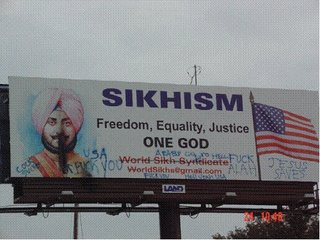Does Racial Profiling Foster Racism?
This was the compelling question that my colleague, Raj, asked his first year students this morning. Raj teaches a class on Terrorism and had just introduced the notion of "racial profiling" on the day I was observing the class.
Before asking the question, however, he pointed out how racial profiling as a policy is a really bad way of gathering intelligence: (a) it involves throwing a large "net" over people that fit a general ethnic or racial profile and pulling them in for interrogation (and in some cases torture), regardless of whether or not they were linked with known terrorist activity (behavior) and (b) this scattershot approach to interrogation--using the inappropriate markers of race or ethnicity and disregarding criminal behavior--does a lot to turn communities against us.
If you buy this premise, namely that racial profiling actually operates this way, then it is not a far leap of logic to see that this intelligence gathering behavior will create racism in otherwise innocent minds (see the photo above, taken on 78 in Jersey). If you have a state policy that says it is legitimate to suspect anyone who looks like an Arab, then before long, you have young people absorbing these ideas and growing up to hate and fear Arabs. What is truly reprehensible about this is that these young peoples racism will be due, in part, to state activity. Raj asked, correctly, shouldn't we be outraged that our government is violating civil liberties in this way?
His students reacted in a predictable way. Anyone who has taught a course that confronts--in a clear-eyed way--racism or classism will be all too familiar with the ways in which students react to evidence that the world is not fair: they deny it. You can pile facts upon facts of incidences of injustices--in this case of racial profiling--and they do all sorts of clever psychological moves to reject the evidence. What is happening here is that the reality of the world--the reality of racial profiling in this case--is running up against a deeply held belief that our government is fair, just and protects individual rights. If racism exists, these students reason, it is the case of a few "bad apples." Or, it is the individual who has failed to see that racial profiling is just a blunt instrument and should not imply that all Arabs are to be feared and distrusted.
Putting to the one side the students rejection of the argument and the evidence in support of the arguments, what is your reaction? Does our government--in carrying out this racial profiling--foster racism that will be lingering for decades to come? Before you answer, let me clarify that I am not talking about tightened security in airports or train stations (or any mass transportation). I am talking about "rounding up" people in Arab communities for no other reason than they are Arab.
Before asking the question, however, he pointed out how racial profiling as a policy is a really bad way of gathering intelligence: (a) it involves throwing a large "net" over people that fit a general ethnic or racial profile and pulling them in for interrogation (and in some cases torture), regardless of whether or not they were linked with known terrorist activity (behavior) and (b) this scattershot approach to interrogation--using the inappropriate markers of race or ethnicity and disregarding criminal behavior--does a lot to turn communities against us.
If you buy this premise, namely that racial profiling actually operates this way, then it is not a far leap of logic to see that this intelligence gathering behavior will create racism in otherwise innocent minds (see the photo above, taken on 78 in Jersey). If you have a state policy that says it is legitimate to suspect anyone who looks like an Arab, then before long, you have young people absorbing these ideas and growing up to hate and fear Arabs. What is truly reprehensible about this is that these young peoples racism will be due, in part, to state activity. Raj asked, correctly, shouldn't we be outraged that our government is violating civil liberties in this way?
His students reacted in a predictable way. Anyone who has taught a course that confronts--in a clear-eyed way--racism or classism will be all too familiar with the ways in which students react to evidence that the world is not fair: they deny it. You can pile facts upon facts of incidences of injustices--in this case of racial profiling--and they do all sorts of clever psychological moves to reject the evidence. What is happening here is that the reality of the world--the reality of racial profiling in this case--is running up against a deeply held belief that our government is fair, just and protects individual rights. If racism exists, these students reason, it is the case of a few "bad apples." Or, it is the individual who has failed to see that racial profiling is just a blunt instrument and should not imply that all Arabs are to be feared and distrusted.
Putting to the one side the students rejection of the argument and the evidence in support of the arguments, what is your reaction? Does our government--in carrying out this racial profiling--foster racism that will be lingering for decades to come? Before you answer, let me clarify that I am not talking about tightened security in airports or train stations (or any mass transportation). I am talking about "rounding up" people in Arab communities for no other reason than they are Arab.



|